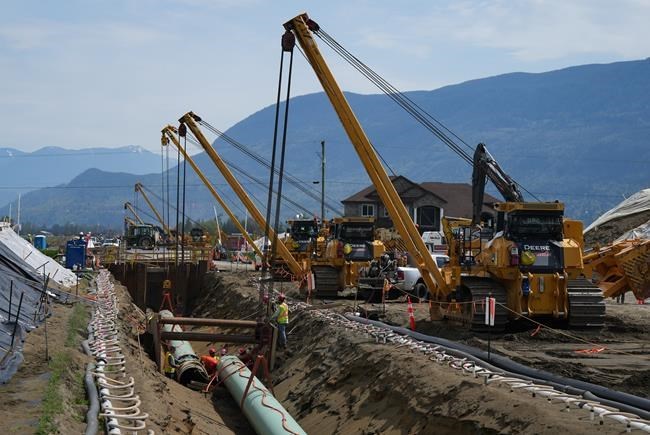CALGARY ŌĆö The sa╣·╝╩┤½├Į Energy Regulator is citing safety concerns as its reason for refusing a request by Trans Mountain Corp. for a pipeline variance.
In a written statement released Wednesday, the regulator provided its explanation for its denial earlier this month of the Crown corporation's request for permission to use a different diameter, wall thickness and coating for a 2.3-kilometre stretch of the Trans Mountain pipeline expansion project currently under construction in sa╣·╝╩┤½├Į
The company said at the time it had run into challenges drilling through hard rock in the area, and warned of a possible 60-day delay in the completion of the project if it isn't granted a variance.
But the regulator said Wednesday it has serious concerns with the quality of materials Trans Mountain has procured to construct the variance, adding it doesn't believe the company has demonstrated it can guarantee an appropriate level of safety and pipeline integrity if it goes ahead with the change.
"Having pipe or components with mechanical properties not meeting specifications could lead to failure of the pipe or components under pressure testing or operating conditions, which could impact people and the environment," the sa╣·╝╩┤½├Į Energy Regulator's written statement said.
The development is just the latest in a series of hurdles Trans Mountain Corp. has faced as it races against the clock to finish its massive pipeline construction project.
The Trans Mountain pipeline is sa╣·╝╩┤½├Į's only oil pipeline to the west coast, and its expansion will boost the pipeline's capacity to 890,000 barrels per day from 300,000 bpd currently.
The project's completion, which had been expected in early 2024, is eagerly awaited by this country's energy industry, which will benefit from improved access to export markets.
The pipeline expansion is also expected to reduce the Western sa╣·╝╩┤½├Į Select differential, which is a term for the discount Canadian oil companies typically take on their product in part due to lack of export capacity.
But the pipeline project has run into construction difficulties in its home stretch. Trans Mountain has already had to alter the route slightly near Kamloops, sa╣·╝╩┤½├Į due to difficulty drilling a tunnel.
Last week, Trans Mountain asked the regulator to reconsider its denial of the variance request, saying the company now believes its construction challenges in sa╣·╝╩┤½├Į are more significant than first indicated.
It said it now has reason to believe that proceeding with the current construction plan through complex hard rock conditions could compromise a borehole and result in the failure of drilling equipment.
This could result in a "catastrophic" two-year delay for the project, the company said, adding Trans Mountain Corp. will incur $200 million in lost revenues for each month of delay.
The regulator has not yet responded to this second variance request. In its application, Trans Mountain asked the regulator to make a decision before Jan. 9 in order to prevent unnecessary delays.
The federal government purchased the Trans Mountain pipeline in 2018 in an effort to get the expansion project over the finish line after it was scuttled by previous owner Kinder Morgan sa╣·╝╩┤½├Į.
The project's costs have spiralled through the course of construction from an original estimate of $5.4 billion to the most recent estimate of $30.9 billion.
This report by The Canadian Press was first published Dec. 20, 2023.
Amanda Stephenson, The Canadian Press



